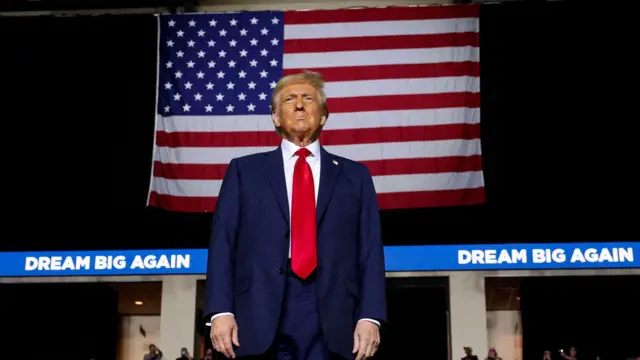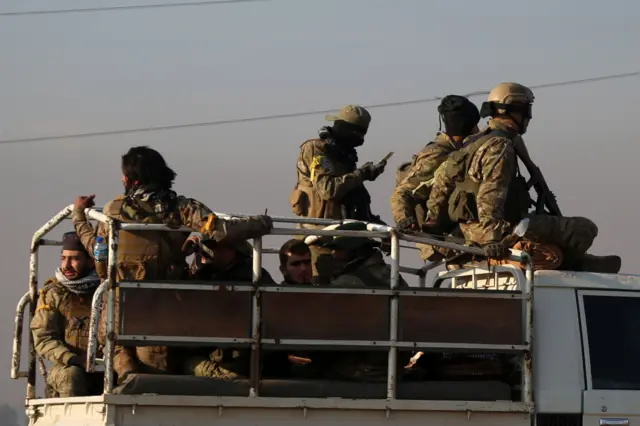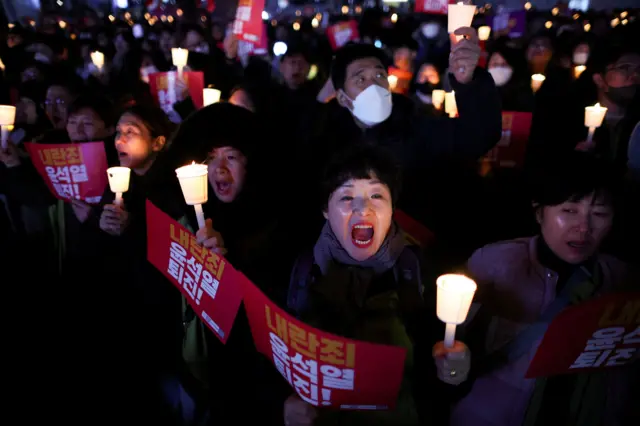
image source, Reuters
The press tour features an article that talks about the choices of US President-elect Donald Trump after his threat to Hamas, and another about Iran’s relationship with Syria in the midst of a war that the latter is witnessing, in addition to declaring martial law in South Korea and quickly retracting it.
In the Israeli newspaper Yedioth Ahronoth, in an article entitled: “Trump threatens Hamas, but what influence does he have?”, the writer saw that Trump’s threat to Hamas, by saying that if the detainees in the Gaza Strip are not released before his inauguration on January 20, will There is hell to pay for in the Middle East, aimed at “accelerating hostage exchange negotiations behind closed doors.”
He pointed out that Trump has “limited” military options, but he has three options to put pressure on Hamas.
The writer talked about the possibility of Trump imposing financial sanctions on Hamas, cutting off funding for it, and closing Islamic associations in the United States, and the matter may come to pressure on Qatar to stop funding the movement.
He added that Trump may carry out his threats against Iran and use Hamas as a justification to impose sanctions, which may prompt Tehran to urge the Palestinian movement to show flexibility in the negotiations.
The third option for Trump is to threaten that the United States “will not contribute” to the reconstruction of Gaza unless Hamas makes concessions, according to the writer.
The writer said that “Trump’s ultimatum was not issued by his negotiating team, but rather by a joint initiative of the administration of current President Joe Biden and Israeli Prime Minister Benjamin Netanyahu.” Biden and his successor, Trump, have a common interest in “resolving the hostage crisis,” according to the writer.
According to the writer, Biden hopes to resolve this crisis before Trump arrives at the White House, while the latter seeks to begin his second presidential term without being drawn into the Middle East conflicts, especially with regard to the Gaza Strip.
Through his platform, “Truth Social,” Trump said, “Those responsible (the Palestinian factions in Gaza) for this incident will suffer greater harm than any harm suffered by anyone else in the long and rich history of the United States. Release the hostages now.”
The writer wondered about Trump’s statement “if it was trustworthy” and whether Hamas “would take it seriously.”
Will Iran return to fighting in Syria?

image source, EPA
As for Al-Sharq Al-Awsat newspaper, writer Abdul Rahman Al-Rashed asked in an article entitled: “Damascus, Tehran, and the New War,” “Will the Iranians return to fighting in defense of the Damascus regime?”, amid a war taking place in Syria.
The writer pointed out that “there was talk this year about the need to end the Iranian presence in Syria after its purpose had ceased to exist 6 years ago, but last Friday Aleppo fell after Idlib and now Hama.”
He pointed out that “signs of disagreement had emerged with the Iranians who expressed their dissatisfaction, and their press commented, ‘We will not leave without compensating us with forty billion dollars for the cost of our defense of the regime during its civil war.'”
However, the writer said that Iran offered military assistance to Syria in light of this war. The timing of the attack was considered “embarrassing”, after Syria completed diplomatic rounds in which it sought to reform its regional and international relations and get out of its classification as an ally of Iran, and maintained a “neutral” military position in the Hezbollah and Hamas wars with Israel.
The writer talked about Iran’s “great” sacrifices in Syria, with its loss of senior leaders from the Revolutionary Guard, and it brought and financed tens of thousands of its militias from Lebanon, Afghanistan, Pakistan, and Iraq, but he wondered, “With the return of war now, will the Iranians return to fighting in defense of the Damascus regime?”
However, he said that the support provided by Tehran “was primarily an Iranian strategic motive, and was not a charitable act,” and added that “its victory in Syria made it a more important player.”
He said, “Syria paid the price in the 2011 uprising for its activity against the American occupation in Iraq, which was also an Iranian project. Syria is still paying the price for its alliance with Tehran, such as the Caesar Act sanctions.”
He believed, “Damascus does not owe Tehran a debt, but rather mutual interests.”
“Failure” to undermine democracy

image source, Reuters
In the Washington Post, the American newspaper wrote an article entitled: “In South Korea, a declaration of martial law and a response to the rule of law,” in which it talks about the “failure” of Korean President Yoon Suk-yul to undermine democracy by declaring a state of emergency.
The newspaper pointed out that Yoon’s announcement of imposing martial law, suspending all political activities, issuing orders for the country’s independent media to adhere to military control, and banning strikes and labor protests put the decades-old democratic state to the test.
Yoon tried to explain his decision by saying that he was protecting his country from “communist forces in North Korea” and the opposition-controlled National Assembly.
But the newspaper believed that the “real threat” to democracy in South Korea was caused by Yoon himself, with his “most likely unconstitutional” attempt to undermine it.
She added that South Korea “passed the test, and its democracy appeared not only intact, but also strengthened.”
The newspaper believed that Yoon, who retracted his decision after it was rejected by the National Assembly (the Korean Parliament), must bear the consequences of his announcement, including the possibility of removing him from his position.
The newspaper reported that there were no “indications of any unusual movements or mobilization of forces that would justify Yoon’s warning of any imminent threat from North Korea.”
ظهرت في الأصل على www.bbc.com
